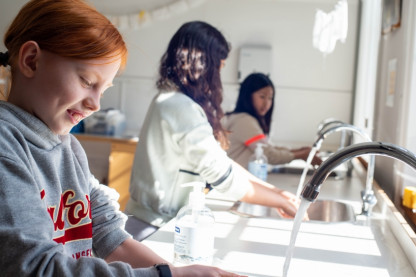Our strategies against bullying at ISJ
Goals
The goals for these strategies are intrinsic to our school’s values, in that the Institute Saint Joseph must be a bullying-free school. The strategies should assist in ensuring that every student at ISJ has a good learning environment, which includes the psychological environment at the school. To achieve this it is incredibly important that the students, teachers and leadership work together to create and uphold a positive learning environment at the school.
The goals are to ensure every teacher, student and parent:
- Know what bullying is
- Know that bullying, in any form, will not be tolerated
- Are given the tools to discover and tackle bullying
- Work together to stop bullying
- Know that we all have a responsibility for preventing bullying
Bullying is not a widespread phenomena at ISJ but it is still important that the school has strategies for preventing bullying. As well as plan for what to do if bullying does unexpectedly happen.
What is bullying?
At the Institute Saint Joseph, we understand bullying to be a conscious effort to hurt another person by submitting them to degrading, offensive or exclusionary behaviour. This includes actions committed physically, verbally, or through use of digital media. Bullying is a group or an individual consistently targeting or excluding a single student.
Bullying is behaviour that goes completely against the Institute Saint Joseph’s core values. One of our values is that: “Each student will be educated in community, democracy and equality.” This requires a school environment that is built on safety, acceptance and happiness. Another of the school’s core values is: “The individual child should want to help their fellows and the world towards being a happier, peaceful and more free society.” This means that, as a student, parent or employee of ISJ, you must behave properly, have respect and take notice of those around you, both in class and other social situations.
Prevention of bullying
At the Institute Saint Joseph we prevent bullying by educating teachers to take notice of the cultures that forms in the school, both in lessons and the student’s social/digital environments. To prevent bullying the school has the following guideline:
- Each teacher must pay attention to the students and the social environment between them. If there is any sign of bullying, the teacher must intervene quickly.
- The school’s AKT-teachers organize sessions for certain year groups with a focus on well-being. On top of this, sessions can be organized for specific students or groups of students, if there is need. The school’s teachers can speak with the AKT-teachers about the students happiness.
- Trips and retreats are a inherent part of the school’s teaching and function. The students will go on 3 camps and two retreats during their schooling. In years three and six there are two camps planned in Denmark, in year eight the class will go to Rome. In years four and nine the classes will go on retreats. As well as the educational aspect the camps and retreats also serve a social purpose. The shared experiences that the classes get when they are away together help to strengthen the class’s community.
- When a new student enters the Institute Saint Joseph, there is a procedure in place for their class teachers and department leadership to pay extra attention to these students, ensuring that they feel safe and accepted from the beginning. New students will also be assigned one or two tutors from their class. The tutors are responsible for helping the new student into the class’s community. In the same way the pedagogues will help new students fit into their after school programs (SFO).
- Every three years, working together with the student council, there will be a learning environment report (UMV). The results of this will be used as a base for further development of a positive learning environment at the school. The results and plan for this can be found on the school’s web page.
- When a student’s absence exceeds what is acceptable the class teacher will contact the parents to find out if the absence is due to difficulties in the students school experience. In this way issues with their happiness can be tackled as soon as possible.
- The school’s leadership takes part in parent-meetings about the parents role in regards to creating a safe and accepting environment for the students.
- In breaks there is a possibility to take part in “The good break,” where a pedagogue organizes structured activities. Students who require more structure in their activities can therefore have better breaks with less conflict and more comfort.
- Older classes have “play patrol” multiple times a week in which they will supervise younger classes in the halls and gym. This way good relations are built up across year groups and the older students are good role models for the younger students.
- The “rest room” is open from 8:10-13:40. This is a place for students to go if they need a break and to talk to an adult. The rest room is also a place where the students can call home if they have gotten sick during school. The rest room is also staffed during the breaks for students who cannot be on the playground or have hurt themselves.
- Every year a theme day will be conducted, where all the classes will work with the school’s core values. Each class will have teaching courses prepared for this day.
